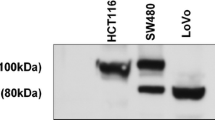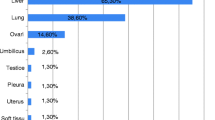Abstract
Colorectal cancer (CC) is one of two diseases, in which the link between cancer proneness and DNA repair deficiency appears to be proved. A strict relationship between mismatch repair (MMR) gene mutations, microsatellite instability (MSI) has been found in familiar colorectal cancer (Lynch syndrome). Tumorigenesis at familiar cancer is initiated by biallelic mutations in the major MMR genes, namely MSH2 or MLH1. One of these mutations is an inherited germline alteration and the other is a somatic one. The initiating mutation in sporadic colorectal tumors was not still identified although biochemical and genetic signs of MMR deficiency are observed in tumor cells. Two currently used colorectal tumor cell lines HCT116 and COLO320HSR were derived from hereditary and sporadic tumors accordingly. HCT116 cell line exhibits MMR-deficiency due to biallelic deletion in MLH1. As a consequence this shows MSI phenotype and a near-diploid karyotype. COLO320HSR cell line is characterized by MSS phenotype with mostly imbalanced aberrations. This indicates MMR proficiency in these cells. However, both MMR-deficient HCT116 and COLO320HSR cells reveal near-diploid karyotype. Earlier we have shown that the number of secondary DNA double strand breaks, induced by methylnitrosourea (MNU), represent functional activity of cellular MMR. In the present study, using this approach we evaluated sensitivity to MNU and MMR activity in two colorectal tumor cell lines (HCT116, COLO320HSR) and compared them to that in the HeLa cell line, which have MMR-proficient phenotype. We showed that cell line COLO320HSR exhibits low MMR activity, close to the level of MMR-activity in HCT116 cell line. We found a mutation in MSH2-G520A gene in COLO320HSR. This neutral mutation apparently is not related to polymorphism as we failed to identify the same mutation in any of MSH2 gene sequences of lymphocytes from 30 patients with sporadic colorectal cancer.
Similar content being viewed by others
References
Ghadimi, B.M., Sackett, D.L., Difilippantonio, M.J., et al., Centrosome Amplification and Instability Occurs Exclusively in Aneuploid, but not in Diploid Colorectal Cancer Cell Lines, and Correlates with Numerical Chromosomal Aberrations, Genes Chromosomes Cancer, 2000, vol. 27, pp. 183–190.
Abdel-Rahman, W.M., Katsura, K., Rens, W., et al., Spectral Karyotyping Suggests Additional Subsets of Colorectal Cancers Characterized by Pattern of Chromosome Rearrangement, Proc. Natl. Acad. Sci. USA, 2001, vol. 98, pp. 2538–2543.
Ribas, M., Masramon, L., Aiza, G., et al., The Structural Nature of Chromosomal Instability in Colon Cancer Cells, FASEB J., 2003, vol. 17, pp. 289–291.
Lengauer, C., Kinzler, K.W., and Vogelstein, B., Genetic Instability in Colorectal Cancers, Nature, 1997, vol. 386, pp. 623–627.
Veigl, M.L., Kasturi, L., Olechnowicz, J., et al., Biallelic Inactivation of hMLH1 by Epigenetic Gene Silencing, a Novel Mechanism Causing Human MSI Cancers, Proc. Natl. Acad. Sci. USA, 1998, vol. 15, pp. 8698–8702.
Leung, S.Y., Yuen, S.T., Chung, L.P., et al., hMLH1 Promoter Methylation and Lack of hMLH1 Expression in Sporadic Gastric Carcinomas with High-Frequency Microsatellite Instability, Cancer Res., 1999, vol. 59, pp. 159–164.
Vasen, H.F., Mecklin, J.P., Khan, P.M., et al., The International Collaborative Group on Hereditary Non-Polyposis Colorectal Cancer (ICG-HNPCC), Dis. Colon Rectum, 1991, vol. 34, pp. 424–425.
Fishel, R., Lescoe, M.K., Rao, M.R., et al., The Human Mutator Gene Homolog MSH2 and Its Association with Hereditary Non-Polyposis Colon Cancer, Cell, 1993, vol. 75, pp. 1027–1038.
Boland, C.R., Thibodeau, S.N., Hamilton, S.R., et al., A National Cancer Institute Workshop on Microsatellite Instability for Cancer Detection and Familial Predisposition: Development of International Criteria for the Determination of Microsatellite Instability in Colorectal Cancer, Cancer Res., 1998, vol. 58, pp. 5248–5257.
Parker, A.R., O’Meally, R.N., Oliver, D.H., et al., 8-Hydroxyguanosine Repair Is Defective in Some Microsatellite Stable Colorectal Cancer Cells, Cancer Res., 2002, vol. 62, pp. 7230–7233.
Branch, P., Aquilina, A., Bignami, M., et al., Defective Mismatch Binding and a Mutator Phenotype in Cells Tolerant to DNA Damage, Nature, 1993, vol. 362, pp. 652–654.
Aquilina, G., Hess, P., Fiumicino, S., et al., A Mutator Phenotype Characterizes One of the Two Complementation Groups in Human Cells Tolerant to Methylation Damage, Cancer Res., 1995, vol. 55, pp. 2569–2575.
Kaina, B. and Christmann, M., DNA Repair in Resistance to Alkylating Anticancer Drugs, Int. J. Clin. Pharmacol. Ther., 2002, vol. 40, pp. 354–367.
Tronov, V.A., Konstantinov, E.M., and Kramarenko, I.I., Role of Excision Mechanisms of DNA Repair in Induction of Apoptosis, Biochemistry (Moscow), 2002, vol. 67, no. 7, pp. 882–889.
Roos, W., Baumgartner, M., and Kaina, B., Apoptosis Triggered by DNA Damage O6-Methylguanine in Human Lymphocytes Requires DNA Replication and Is Mediated by p53 and Fas/CD95/Apo-1, Oncogene, 2004, vol. 23, pp. 359–367.
Biedler, J.L. and Spengler, B.A., Metaphase Chromosome Anomaly: Association with Drug Resistance and Cell-Specific Products, Science, 1976, vol. 191, pp. 185–187.
Kleivi, K., Teixeira, M.R., Eknaes, M., et al., Genome Signatures of Colon Carcinoma Cell Lines, Cancer Genet. Cytogenet., 2004, vol. 155, pp. 119–131.
Bayum, A., Isolation, Characterization, and Demonstration of Lymphocytes, Granulocytes, and Macrophages, Lymphocytes: Isolation, Fractionation, and Characterization, Natvig, J. B., Perlmann, P., and Wigzell, H., Eds., Baltimore: Univ. Park, 1976, pp. 9–19.
Singh, N.P., Microgels for Estimation of DNA Strand Breaks, DNA Protein Crosslinks and Apoptosis, Mutat. Res., 2000, vol. 455, pp. 111–127.
Konca, K., Lankoff, A., Banasok, A., et al., A Cross-Platform Public Domain PC Image-Analysis Program for the Comet Assay, Mutat. Res., 2003, vol. 534, pp. 15–20.
Holley, W.R. and Chatterjee, A., Clusters of DNA Induced by Ionizing Radiation: Formation of Short DNA Fragments: I. Theoretical Modeling, Radiat. Res., 1996, vol. 145, pp. 188–199.
Kolodner, R.D., Hall, N.R., Lipford, J., et al., Structure of the Human MLH1 Locus and Analysis of a Large Hereditary Nonpolyposis Colorectal Carcinoma Kindred for mlh1 Mutations, Cancer Res., 1995, vol. 55, pp. 242–248.
Kolodner, R.D., Hall, N.R., Lipford, J., et al., Structure of the Human MLH2 Locus and Analysis of Two Muir-Torre Kindreds for msh2 Mutations, Genomics, 1994, vol. 24, pp. 516–526.
Sambrook, J., Fritsch, E.F., and Maniatis, T., Molecular Cloning: A Laboratory Manual, New York: Cold Spring Harbor Lab. Press, 1989.
Ganguly, A., Rock, M.J., and Prockop, D.J., Conformation-Sensitive Gel Electrophoresis for Rapid Detection of Single-Base Differences in Double-Stranded PCR Products and DNA Fragments: Evidence for Solvent-Induced Bends in DNA Heteroduplexes, Proc. Natl. Acad. Sci. USA, 1993, vol. 90, pp. 10325–10329.
Tronov, V.A., Kramarenko, I.I., Smirnova, T.D., et al., Comparison of Geno-and Cytotoxicity of Methylnitrosourea on MMR-Proficient and MMR-Deficient Human Tumor Cell Lines, Tsitologiya, 2006, vol. 48, no. 1, pp. 19–27.
Ochs, K. and Kaina, B., Apoptosis Induced by DNA Damage O6-Methylguanine Is Bcl-2 and caspase-9/3 Regulated and Fas/caspase-8 Independent, Cancer Res., 2000, vol. 60, pp. 5815–5824.
Hirose, Y., Berger, M.S., and Pieper, R.O., p53 Effects Both the Duration of G2/M Arrest and the Fate of Temozolomide-Treated Human Glioblastoma Cells, Cancer Res., 2001, vol. 61, pp. 1957–1963.
Hirose, Y., Katayama, M., Stokoe, D., et al., The p38 Mitogen-Activated Protein Kinase Pathway Links the DNA Mismatch Repair System to the G2 checkpoint and to Resistance to Chemotherapeutic DNA-Methylating Agents, Mol. Cell. Biol., 2003, vol. 23, pp. 8306–8315.
Karran, P., Mechanisms of Tolerance to DNA Damaging Therapeutic Drugs, Carcinogenesis, 2001, vol. 22, pp. 1931–1937.
D’Atri, S., Tentori, L., Lacal, P.M., et al., Involvement of the Mismatch Repair System in Temozolomide-Induced Apoptosis, Mol. Pharm., 1998, vol. 54, pp. 334–341.
Hirose, Y., Berger, M.S., and Pieper, R.O., Abrogation of the Chk1-Mediated G2 Checkpoint Pathway Potentiates Temozolomide-Induced Toxicity in a p53-Independent Manner in Human Glioblastoma Cells, Cancer Res., 2001, vol. 61, pp. 5843–5849.
Bolzan, A.D., Paez, G.L., Bianchi, M.S., et al., Analysis of Telomeric Repeats and Telomerase Activity in Human Colon Carcinoma Cells with Gene Amplification, Cancer Genet. Cytogenet., 2000, vol. 120, pp. 166–170.
Tsushimi, T., Noshima, S., Oga, A., et al., DNA Amplification and Chromosomal Translocations Are Accompanied by Chromosomal Instability: Analysis of Seven Human Colon Cancer Cell Lines by Comparative Genomic Hybridization and Spectral Karyotyping, Cancer Genet. Cytogenet., 2001, vol. 126, pp. 34–38.
Author information
Authors and Affiliations
Additional information
Original Russian Text © VA. Tronov, I.I. Kramarenko, S.F. Zakharov, 2007, published in Genetika, 2007, Vol. 43, No. 4, pp. 537–544.
Rights and permissions
About this article
Cite this article
Tronov, V.A., Kramarenko, I.I. & Zakharov, S.F. Mismatch repair (MMR) efficiency and MSH2 gene mutation in human colorectal carcinoma cell line COLO320HSR. Russ J Genet 43, 430–436 (2007). https://doi.org/10.1134/S1022795407040126
Received:
Accepted:
Issue Date:
DOI: https://doi.org/10.1134/S1022795407040126




